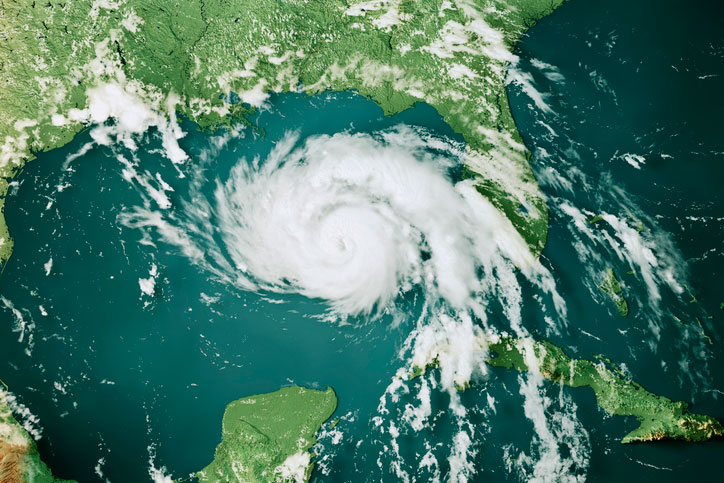Written by Scott Wilson

Clinical social workers often get most of the attention when it comes to education and licensing in the field. In fact, of the 13 schools in Florida that offer CSWE-accredited Master of Social Work degrees, there are only two that are entirely aimed at generalist practice.
Of course, any one of those 13 programs will allow you to practice outside of the clinical environment if you choose, but you would essentially have more than what you needed since most are designed with the blend of clinical courses that can lead to clinical licensure.
But something that Florida has figured out is that it’s often macro- and mezzo-level social workers outside of the clinical environment who can make the biggest difference for the most people in the least amount of time.
But Florida is ahead of the game in recognizing the importance of these roles. When hurricanes like Irma, Ian, Ida, and Helene come crashing across the Keys or wandering through low-lying parts of Miami or Tampa, it’s often non-clinical social workers manning the hotlines, wading through receding floodwaters, or staffing up state, county, and federal assistance and evacuation sites to help relocate the displaced.
Even when the state itself isn’t in crisis, generalist social workers are handling case management duties at places like the University of Florida Health network Department of Patient and Family Resources, or managing Family Wellness Services at Jewish Family & Children’s Service of the Suncoast.
These are positions where high levels of competency and qualification really matter on a large scale. And in Florida, you can show you have those qualifications by earning a Certified Master of Social Work credential.
What Is a Certified Master Social Worker in Florida?
The role of a Certified Master Social Worker (CMSW) in Florida may be one of the least understood social work credentials in the country.
It exists alongside the two other more standard credentials for clinical professionals regulated by the Florida State Board of Clinical Social Work, Marriage & Family Therapy and Mental Health Counseling – the Licensed Clinical Social Worker (LCSW) for clinical practitioners, and the Registered Clinical Social Work Intern (RCSWI) credential for those working toward the LCSW.
The CMSW stands on its own, completely separate from those clinical licenses. Unlike other states where the road to clinical licensure is a bit more intensive due to the personal nature of the counseling involved, Florida’s CMSW requires more supervised experience — a total of three years, while the LCSW requires only two.
A CMSW can even be seen as a post-LCSW credential for mezzo and macro work.
The CMSW is neither a registration (an official notification of intention to practice as a social worker) or a license (official authority to engage in certain social services or counseling practices), although the Board website describes it as a license. But you’ll notice that it’s the Board of Clinical Social Work, not of social work in general.
It’s illegal to call yourself a licensed clinical social worker in Florida without the LCSW license, but there are no protections for the title of Certified Master Social Worker.
In fact, in the governing laws that create the certification, Chapter 491 of the Florida Statutes, authority to issue the CMSW is technically left to the Department of Health, even though the Board still administers the paperwork.
Unlike clinical social work licenses, certification doesn’t come with any legal practice authority or a clearly defined scope of practice. Instead, it may be best viewed as a state government version of the sort of professional certifications offered by NASW and other major national social work organizations. It serves as an official assessment and approval of your qualifications to handle administrative, organizing, planning, and other mezzo-level social work services.
Florida's CMSW Credential Is Unique in the World of Social Work
A Florida CMSW is roughly similar to the Licensed Master Social Worker (LMSW) credential offered in many other states — the CMSW does not grant full independent clinical practice authority, but offers a master’s-level credential reserved for MSW graduates performing many other kinds of social work services.
Unlike Florida’s CMSW credential, the LMSW offered in most states grants some ability to practice clinically under supervision and represents a step on the path to full clinical licensure. But in Florida, CMSWs are specifically prohibited from clinical practice — namely individual assessment, diagnosis of common mental and emotional disorders, and treatment through counseling and other clinical interventions.
Those are all things CMSWs can’t do unless they also hold an LCSW. But what they can do is literally everything else that falls within the purview of social work.
A 2019 bill proposed in the Florida Senate attempted to add more specific language and a defined scope of practice. It would have made the CMSW a license rather than a certification, moved authority for granting it to the Board, and changed some of the qualifications. The practical experience requirement would have gone down to two years, as with LCSWs, but the ability to qualify on the basis of an MSW with a clinical specialization would be removed, so only a generalist MSW would meet the requirements. It would have provided title protection and prohibited the use of the term in advertising and professional representation for anybody who doesn’t hold the credential.
Unfortunately, the bill died in committee, so the possibility of updates will have to wait for a future legislative session.
Because of this, the CMSW may actually be a credential that is sought out by social workers who already hold an LCSW. It doesn’t require much more in the way of qualifications. In fact, LCSW post-graduate supervised experience can count toward a CMSW.
What it does offer to both LCSWs and non-clinical social workers is official validation they have studied and mastered the administrative and development aspects of social work just as intensively as micro social work. For top jobs in human services in the state, that can be a big boost to your qualifications.
CMSW Practice Areas Span Mezzo and Macro Skills in All Aspects of Florida Social Services

CMSWs are responsible for applying their deep understanding of social work theory and methods in traditional macro and mezzo areas of practice and intervention. Those are the roles that do not require or focus on direct clinical psychosocial supports, but instead take aim at helping people deal with social systems and through broader human services support.
That can still involve plenty of individual face-to-face support. CMSWs are experts at coordinating care and conducting case management and advocacy for clients. They may work in hospitals like Johns Hopkins All Children’s in St. Petersburg, ensuring patients are receiving what they need for successful discharge and recovery; they can conduct non-diagnostic assessments, develop treatment plans, evaluate environmental circumstances across a range of populations and practice areas, such as with addiction treatment centers like Seaside Palm Beach.
Working as a CMSW in Population Health Services in disadvantaged communities like Immokalee with Americorps can prevent disease outbreaks that would wreak havoc in medically vulnerable populations.
This is also the level of social work that takes aim directly at communities and social services. CMSWs act as consultants, supervisors, sources of information and research, organizers, and effective advocates for at-risk populations. They may develop and implement new services, or act as administrators of existing programs and activities that support people and communities in need.
What Type of Jobs Are CMSW Social Workers Eligible for in Florida?
Jobs for CMSW holders in Florida are tougher to sort out in the listings than those for clinical social workers. Although the state doesn’t have a licensed master social worker (LMSW) credential, you’ll see plenty of listings right here in Florida that are looking for people with a comparable license.
In general, any position that is listed that requires an MSW but which does not have clinical licensing requirements is probably a good fit for a CMSW.
A CMSW should meet federal requirements for certain positions that require licensure at the master’s degree level.
This includes administrative and organization positions of all sorts, in all of the standard categories of social work.
It can also include big policy and advocacy pushes, like the Florida Needs Healthcare petition drive to put Medicaid expansion on the ballot. CMSWs, with their administrative and policy expertise, understand better than anyone what the challenges of being ranked 47 out of the 50 states when it comes to healthcare access and affordability. More importantly, they have the education and the credentials to help do something about it.
A Look at Salary Levels for Certified Master Social Workers in Florida

The Bureau of Labor Statistics (BLS) lists four categories of social workers in their data tracking salaries and employment levels. They do not, however, break down their data between clinical and non-clinical practice roles and licensure, or by education level—some uncredentialed social workers with only bachelor’s or associate degrees are included in the data as well.
So the average annual salary numbers for 2023 are very general, but still show all the signs of offering a solid living to Certified Master Social Workers in just about any kind of job in Florida:
- Child, family, and school social workers - $50,160
- Healthcare social workers - $62,990
- Mental health and substance abuse social workers - $55,540
- All other social workers - $59,390
Of course, experience, industry, and additional education or certifications all play in to total compensation. So there are plenty of ways to boost your salary as a generalist social worker in Florida—the CMSW is only your first step.
How To Become a Certified Master Social Worker (CMSW) in Florida
Even with a credential that is slightly more nebulous than most, the one thing that is straightforward about the CMSW role in Florida is how you get the certification. The Board of Clinical Social Work, Marriage & Family Therapy and Mental Health Counseling offers a clear and clean process for becoming qualified for and applying as a CMSW.
1. Get a CSWE-Accredited MSW Degree With Generalist Track
Just like it says in the title, this is a position for master social workers, which requires a CSWE-accredited Master of Social Work degree to attain.
That gives you 13 top flight universities to choose from in Florida, and many more online.
Only two of those 13 schools offer only a generalist track. But even those without a generalist track will be accepted as meeting CMSW qualifications.
Although your MSW must have a certain amount of administrative and organizational coursework, those courses will be covered in a clinical social work degree as well.
Additionally, you’re required to complete at least 3 semester hours of graduate level coursework in these subjects:
- Agency administration and supervision
- Profess planning and evaluation
- Staff development
- Research
- Community organization
- Community services
- Social planning
- Human services advocacy
The coursework must be on your official transcript, which will need to be submitted directly by your college either by sealed official envelope or secure electronic transmission.
2. Build Three Years of Experience as a Social Worker
The CMSW requires at least three years of documented practical experience in social work. At least two of those years must be at the post-master’s level, though all three can be.
The one year of pre-master’s could be documented experience you gained under a BSW before entering your MSW program.
Alternatively, it’s possible to count your supervised experience as a Registered Clinical Social Work Intern (RCSWI) toward that requirement. Of course, that would imply you have already earned an LCSW, which is a perfectly solid foundation for the CMSW.
Post-master’s experience must be performed under the supervision of a person who meets the education and experience requirements to become a CMSW or LCSW themselves. Technically, your supervisor doesn’t actually need to hold one of these credentials as long as they meet the education and experience requirements, but as a practical matter, they very likely will.
3. Pass the Required Generalist Social Work Examination
The validation of your macro-level knowledge and practical skills in generalist social work settings comes through taking and passing the ASWB (Association of Social Work Boards) Advanced Generalist examination.
This 170 question, multiple-choice exam assesses critical knowledge and reasoning abilities around the tasks performed by generalist social workers at the highest standards.
There are four general areas that the test is designed to assess:
- Human Development, Diversity, and Behavior in the Environment
- Profess planning and Intervention Processes and Techniques for Use Across Systems
- Intervention Processes and Techniques for Use With Larger Systems
- Professional Relationships, Values and Ethics
These dive into details in areas as diverse as fiscal management and symptoms of neurological disorders. You can expect to spend months preparing for the test.
The exams are computer-based but conducted primarily at in-person testing centers run by PSI. You must file your application with the Board and be approved before you will be allowed to register to take the test.
4. Satisfy General Background Requirements for Health and Criminal History
Some of the best social workers come from the communities and populations they serve. No one knows better how to help prisoners as a Forensic Jail Case Manager in Escambia county’s Corrections Department than someone who came up on the wrong side of the law through the Montclair Boyz.
Even a criminal background — and record — won’t automatically disqualify you (unless your youthful indiscretion was for healthcare or welfare fraud—that’s always an automatic no for Florida licensure). But having a record requires some extra steps as you apply for your CMSW.
You’ll need to provide the final disposition records from the clerk of the court that handled your case, as well as verification that you have completed parole, probation, or other court-mandated requirements that may have come with it.
You’ll also need to submit a written explanation for your actions, coming clean to the Board.
This is also true of any kind of professional disciplinary action that you may have received as a social worker in another jurisdiction, or as an LCSW in Florida. And if you have any healthcare issues that may be obstacles to working as a CMSW, you will need a signed letter from a doctor verifying that you are capable of performing in that role.
5. Staying Certified as a Master Social Worker in Florida

It’s not enough to be at the top of your game in macro and mezzo work at a single point in time to qualify for the CMSW: you have to keep proving yourself through continuing education to stay current in the field, as well.
Every social work credential in Florida expires on March 31 of every odd-numbered year unless renewed. You can find online renewal information through the Florida Health Medical Quality Assurance Online Services portal.
The most important part of your renewal, though, will be putting in 30 hours of verified and accepted continuing education during each of the two year license periods.
Of the 30 hours, each renewal period you will have to put 2 hours toward medical errors and another 3 hours toward ethics and boundaries training.
The remaining hours are mostly left free to devote toward any subject or specialization you choose.
There are two exceptions, however, each required every third renewal period. The first is for three hours of Laws and Rules training on Florida regulations, to ensure you stay current with any updates to the law. The second is for 2 hours of training in recognizing and reporting domestic violence.
You’re not required to report any CE during your first renewal, since that first period is likely to be less than two full years.
All hours have to be delivered by approved providers. The easiest way to find those is through the CEBroker website. That’s the organization used by the state to track your hours, and includes a searchable database of classes from approved providers. Of course, other private organizations are also on the list, as are major industry groups like the Florida chapter of the National Association of Social Workers.
Consider Professional Certification to Complement Florida State Certification as a Master Social Worker
While state certification is a way to have your superior skillsets in macro and mezzo social work practice validated, there are also numerous independent professional certifications available nationally for social workers. These are primarily available through the National Association of Social Workers.
Many of the certifications are aimed toward low-level or clinical social workers. But there are a number of certs in various fields that are a great way to achieve even higher levels of professional recognition and accomplishment for non-clinical work. They include:
- Certified Advanced Social Work Case Manager (C-ASWCM)
- Advanced Social Worker in Gerontology (ASW-G)
- Certified Social Worker in Health Care (C-SWHC)
- Advanced Certified Hospice and Palliative Social Worker (ACHP-SW)
- Military Service Members, Veterans, and Their Families - Advanced Social Worker (MVF-ASW)
- Certified Advanced Children, Youth, and Family Social Worker (C-ACYFSW)
- Academy of Certified Social Workers (ACSW)
Each of these comes with their own experiential, educational, and exam requirements, as well as ongoing continuing education standards.
The CMSW may not be as popular as the LCSW credential in Florida, but it represents a serious commitment to the important job of macro social work. CMSWs can make a powerful difference in all areas of social work throughout the state and the nation.
2023 US Bureau of Labor Statistics salary and employment figures for Social Workers reflect national data, not school-specific information. Conditions in your area may vary. Data accessed September 2024.
